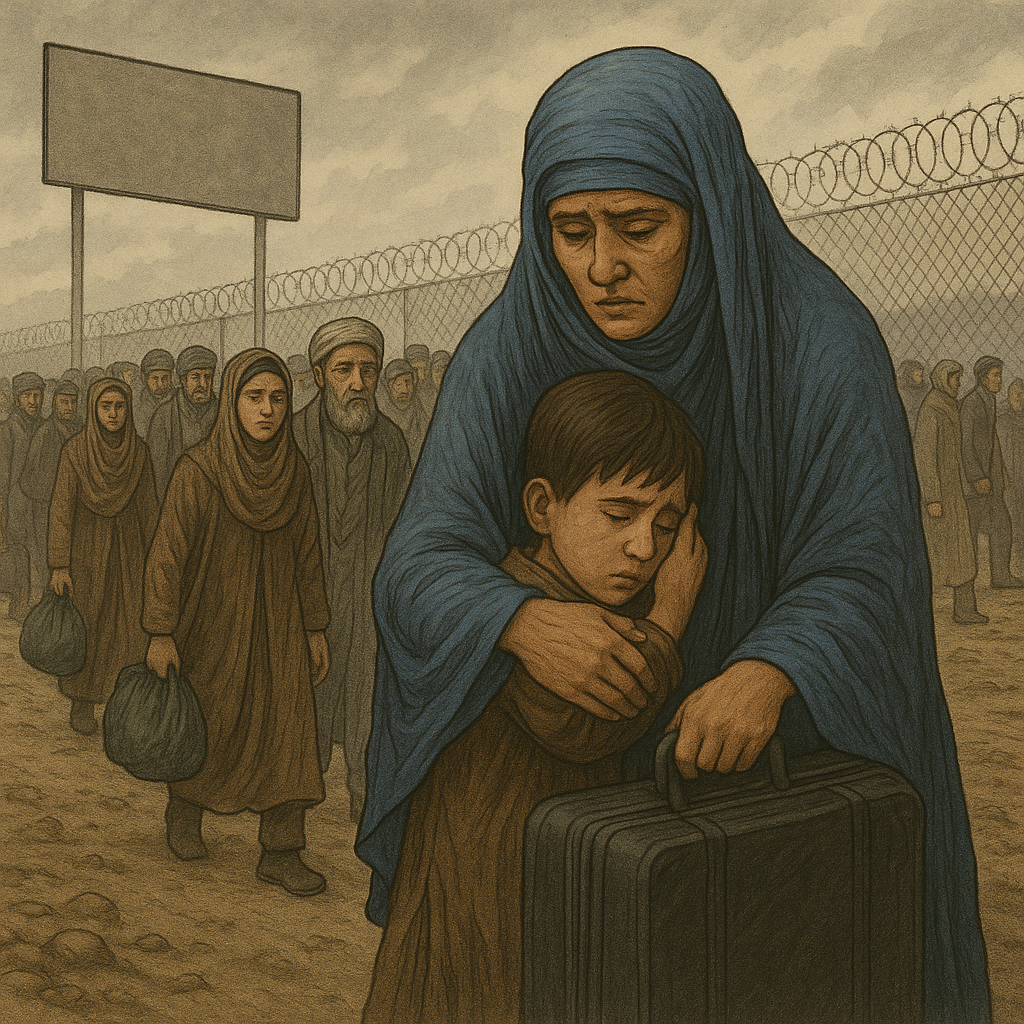Human cost and legal complexities of Afghan deportation.

Displaced families make their way across a desolate border zone, carrying the weight of uncertainty and loss.
After hosting Afghan refugees for over four decades, Pakistan has initiated the return of Afghan nationals. In October 2024, Pakistan announced a three-phase plan that aimed the return of Afghan nationals residing in Pakistan to Afghanistan. The first phase, implemented in March 2025, focused on individuals without legal status, urging them to leave the country voluntarily. While Pakistan has cited national security and administrative concerns, the human cost and legal dimensions of this policy demand deeper reflection.
Pakistan has long been one of the most generous refugee-hosting countries in the world. Millions of Afghans sought refuge here following the Soviet invasion, civil war, and more recently, the return of Taliban rule in 2021. Many of those now facing repatriation were born and raised in Pakistan. They speak local languages, share cultural practices, and are deeply rooted in the communities they’ve grown up in. For them, the country they are being sent to—Afghanistan—is unfamiliar and, in many cases, unstable.
The policy shift coincides with rising security tensions between Islamabad and Kabul, particularly concerns over cross-border militancy involving groups such as Tehrik-e-Taliban Pakistan (TTP). While national security is a legitimate and sovereign priority, a distinction must be maintained between addressing threats and upholding humanitarian obligations. Managing borders and security is crucial, but so is ensuring that innocent civilians—especially women and children—do not bear the brunt of broader geopolitical challenges.
The current deportations pose difficult questions not only from a humanitarian standpoint but also in the realm of international law. The principle of non-refoulment—enshrined in the 1951 Refugee Convention—prohibits sending individuals back to countries where they face serious threats to life or freedom. While Pakistan is not a party to the Convention, this principle is widely recognized as customary international law. Deporting individuals, particularly women and girls, to conditions that may compromise their safety raises significant ethical and legal concerns.
Afghanistan is currently facing deep economic uncertainty, political instability, and social challenges. According to Human Rights Watch, 23.7 million Afghans—nearly half the population—require humanitarian assistance, with 12.4 million facing food insecurity and 2.9 million at risk of hunger. Those returning are likely to face limited access to healthcare, education, and employment. For children and young adults who have known only Pakistan as home, this transition is especially disruptive.
Among the most vulnerable are Afghan women and girls. Under current restrictions in Afghanistan, many are unable to attend school, work, or participate in public life. For single mothers, widows, or young girls, the risk of forced marriage or social isolation is heightened. Any decision affecting their return should consider these realities, as international human rights frameworks, including the Convention on the Elimination of All Forms of Discrimination Against Women (CEDAW), call for the protection of women from such vulnerabilities.
The issue of statelessness also merits consideration. Many Afghan children born in Pakistan lack formal identification documents from either country. Pakistan does not offer birthright citizenship, and Afghan documentation is often unavailable or difficult to obtain. As a result, thousands of children could grow up without legal identity, hindering their access to education, healthcare, and protection. The 1961 Convention on the Reduction of Statelessness emphasizes that children should not be left stateless due to the circumstances of their birth.
While Pakistan is navigating a complex situation with limited international support, the burden should not fall solely on its shoulders. The Global Compact on Refugees, adopted in 2018, encourages shared international responsibility and sustainable solutions. The international community must play a more active role—through financial assistance, legal frameworks, and collaborative resettlement initiatives—to support both Pakistan and the affected refugee populations.
Behind every deportation is a deeply personal story: a man who built a life over decades, a student with dreams of becoming an engineer, a mother watching her home dismantled, or a young girl separated from the only community she has known. These are not faceless numbers; they are individuals whose lives are shaped by policies and politics.
Pakistan has the sovereign right to regulate its borders and protect its national interests. At the same time, it also has a long-standing legacy of hospitality and compassion. As this policy unfolds, careful attention to humanitarian values, legal standards, and moral responsibility can help ensure that vulnerable populations are not left behind. The path forward lies not in erasure, but in empathy, collaboration, and a shared commitment to human dignity.



